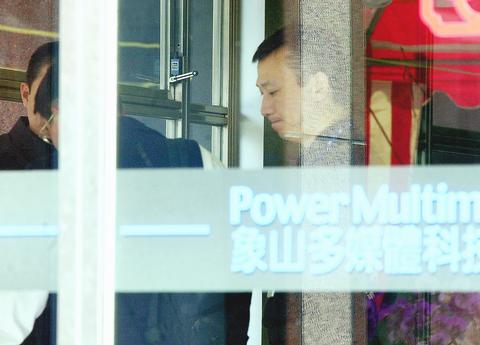The Power News (勁晚報) evening newspaper last Thursday surprised the nation by shutting down after two-and-a-half years of circulation. Marketing analysts say the shut-down was caused by the management's inability to establish circulation channels, but former editors of the paper claim that the founder's unfamiliarity with journalism led to the closure.
The Hsiang Shan group established the Power News evening newspaper in 1999, after it invested in the Independence Evening Post (自立晚報) but failed to win the controlling rights of the newspaper.

TAIPEI TIMES FILE PHOTO
Power News founder, Chiang Tao-sheng (江道生), promised to break even within three years, but decided to shut down the newspaper after a loss of up to NT$1.6 billion. Its managing-level editors had promised to make the paper better than rivals, the United Evening News (聯合晚報) and the China Times Express (中時晚報), with a unique editing style, colorful pages and punchy writing, but most quit before the Power News closed.
Rumors indicated that the Power News had lost NT$80 million to NT$90 million every month since it started publishing, and marketing experts said that the losses were caused by a lack of circulation channels.
"The newspaper's inability to establish its circulation channels resulted in its closure," said Chai Chung-chin (翟仲勤), a senior media buyer.
The Power News had suffered many setbacks in the establishment of its circulation channels. It alleged that its two rival newspapers, the United Evening News and the China Times Express, obstructed its process of establishing circulation channels.
According to statistics from advertising agencies, circulation of the United Evening News and the China Times Express are 250,000 each. The Power News' circulation was claimed to be 200,000, and the Independence Evening Post's circulation was about 150,000.
Chen Chi-fang (
"We tried to produce a different evening newspaper, but the idea was not accepted by the newspaper's management. Senior editors from other newspapers even commented that we were qualified enough for daily newspaper printing. It just needs time and patience," Chen said.
Chen also said that Chiang rose to fame and wealth through starting a successful kindergarten chain, but that this doesn't mean that he is a qualified media operator.
"He deeply believes that effective financial and administrative management would result in good newspaper production, but something else is more important to make a new newspaper, such as style and the establishment of a good reputation," Chen said.
The Power News is not the first paper to fold in the last six months. The Independence Evening Post was shut down at the end of last year.

INVESTIGATION: The case is the latest instance of a DPP figure being implicated in an espionage network accused of allegedly leaking information to Chinese intelligence Democratic Progressive Party (DPP) member Ho Jen-chieh (何仁傑) was detained and held incommunicado yesterday on suspicion of spying for China during his tenure as assistant to then-minister of foreign affairs Joseph Wu (吳釗燮). The Taipei District Prosecutors’ Office said Ho was implicated during its investigation into alleged spying activities by former Presidential Office consultant Wu Shang-yu (吳尚雨). Prosecutors said there is reason to believe Ho breached the National Security Act (國家安全法) by leaking classified Ministry of Foreign Affairs information to Chinese intelligence. Following interrogation, prosecutors petitioned the Taipei District Court to detain Ho, citing concerns over potential collusion or tampering of evidence. The

NEGOTIATIONS: Taiwan has good relations with Washington and the outlook for the negotiations looks promising, Minister of Economic Affairs J.W. Kuo said Taiwan’s GDP growth this year is expected to decrease by 0.43 to 1.61 percentage points due to the effects of US tariffs, National Development Council (NDC) Minister Paul Liu (劉鏡清) said at a meeting of the legislature’s Economics Committee in Taipei yesterday, citing a preliminary estimate by a private research institution. Taiwan’s economy would be significantly affected by the 32 percent “reciprocal” tariffs slapped by the US, which took effect yesterday, Liu said, adding that GDP growth could fall below 3 percent and potentially even dip below 2 percent to 1.53 percent this year. The council has commissioned another institution

TRADE: The premier pledged safeguards on ‘Made in Taiwan’ labeling, anti-dumping measures and stricter export controls to strengthen its position in trade talks Products labeled “made in Taiwan” must be genuinely made in Taiwan, Premier Cho Jung-tai (卓榮泰) said yesterday, vowing to enforce strict safeguards against “origin laundering” and initiate anti-dumping investigations to prevent China dumping its products in Taiwan. Cho made the remarks in a discussion session with representatives from industries in Kaohsiung. In response to the US government’s recent announcement of “reciprocal” tariffs on its trading partners, President William Lai (賴清德) and Cho last week began a series of consultations with industry leaders nationwide to gather feedback and address concerns. Taiwanese and US officials held a videoconference on Friday evening to discuss the

NEGOTIATIONS: The US response to the countermeasures and plans Taiwan presented has been positive, including boosting procurement and investment, the president said Taiwan is included in the first group for trade negotiations with the US, President William Lai (賴清德) said yesterday, as he seeks to shield Taiwanese exporters from a 32 percent tariff. In Washington, US Trade Representative Jamieson Greer said in an interview on Fox News on Thursday that he would speak to his Taiwanese and Israeli counterparts yesterday about tariffs after holding a long discussion with the Vietnamese earlier. US President Donald Trump on Wednesday postponed punishing levies on multiple trade partners, including Taiwan, for three months after trillions of US dollars were wiped off global markets. He has maintained a 10 percent